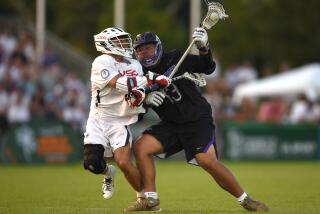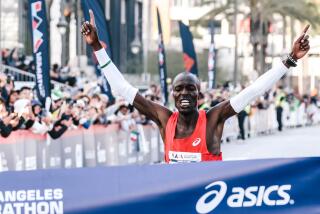They’re Dutch Masters of Glee
They were the last two skaters of the night, the last ones who could steal the Netherlands’ gold.
They were two skaters from Germany, the Netherlands’ biggest sports rival.
They were skating through thousands of Dutch fans who filled the Oval Lingotto with gaudy costumes and boozy song.
On a snowy Sunday evening here, Anni Friesinger and Sabine Voelker were facing the coldest two minutes of their careers.
Until they heard the strangest sound.
Warmth.
As the women skated into each turn, the sea of Dutch orange parted and washed over them in -- would you believe it? -- cheers.
Huge cheers. Crazy cheers. Giant-fans-rooting-for-the-Dodgers-in-the-ninth-inning-of-a-tie-game cheers.
It was chants from a different culture. It was love in a different language. But it resonated with an ancient theme that, however buried, remains understood by all.
On a night when Dutch skater Marianne Timmer won the gold medal in the 1,000 meters, the Dutch skating fans retired the gold medal for sportsmanship.
“Crazy, huh?” said Ireen Wust, the Dutch skater who finished fourth. “It’s so cool.”
Crazy cool is right.
In an Olympics of half-filled arenas and tepid reactions, the Dutch have painted the place in noise and laughter and perspective.
“We love our skaters, but we don’t just cheer individuals, we cheer the sport,” said Nelleke Weltevrede, a female government worker who donned a bright orange wig and orange eyelashes and drove 12 hours to spend a few days cheering a bunch of athletes skating in circles.
Passion lives here? No, passion lives there, in the Oval Lingotto stands, where the Dutch have nightly filled about 5,000 of the 8,250 seats
They are the only fan group to have a uniform, which is, essentially, anything orange and ugly, from giant skate caps to World War II-style helmets to Viking headdresses to various fright wigs and scarves.
Imagine a cheering section composed entirely of Elton Johns.
“To us, sport is a carnival,” said Gerrit Van Kellen, a businessman dressed as an orange-clad war hero. “And we are not fans, we are a family.”
They are also the only fan contingent to have its own pep band, an 11-piece brass and bass-drum group that wears huge orange wooden shoes and bears a name -- Kleintje Pils -- that translates to “Small Beer.”
On the bass drum is the drawing of an ancient half-naked Dutchman dancing with a bottle.
Listening to them play an old Kenny Rogers tune while the fans sing “She Believes in Me” in Dutch, well, that might require more than a small beer.
“You know this is not our real jobs, right?” said trumpeter Jan Van der Hulst.
In the Netherlands, skating is not a job, it is a natural resource that has given the country much of its sports identity.
Skating supposedly began in Holland in the 14th century, as a way of navigating the country’s many frozen canals. The first speedskating world championship was held in Holland in 1889. Even today, Dutch of all ages skate the way Americans play YMCA basketball or slow-pitch softball.
“It’s really the only winter sport we’re good at,” said Peter Schurink, a paramedic. “We’ve got no snow. We’ve got no hills. When it gets really cold, we have frozen ponds, and that’s what we do.”
While the Americans have since caught up, the Dutch remain a dominant force in world speedskating, with six medals so far in Turin.
The Dutch fans arrive at the Oval Lingotto early, singing with the band and cheering those young skaters who circle the course, inspecting the track.
The Dutch fans are the last to leave the speedskating venue, chanting for each of the top three finishers by name, even if they can’t pronounce the name and have never been to the country.
And they have been doing this since, it seems, the Ice Age.
Remember the Olympic fans who once serenaded American Bonnie Blair with “My Bonny Lies Over the Ocean”? Yep, the Dutch.
Who did Shani Davis accompany arm-over-shoulder around the track to wild cheering and singing Saturday night? Yep, the Dutch third-place finisher, Erben Wennemars.
“We’re crazy, but in a good way,” Weltevrede said.
The Dutch fans are so loud and un-Turin-like, they make the workers here nervous. When a worker heard I was planning to interview Dutch fans, she begged, “Please, can you ask them to be a little more quiet?”
Never. The words of the Dutch speedskating fans should be a message to fans everywhere, including those of the Dutch national soccer team who are infamous for fighting their German counterparts.
Why can’t it be just about sport? Why can’t you enjoy your favorite team’s success without jeering at your opponent’s failure?
Remember when the Nebraska football fans gave Texas a standing ovation after being upset by the Longhorns at Lincoln in 1998?
The Dutch skating fans do that sort of thing every night.
They have once again shown the world that there can be victory without gloating, and defeat without embarrassment, and surely there is a lesson there for everyone.
“They cheer louder for their own skaters, but they still cheer for everyone,” said Canada’s Cindy Klassen, the 1,000 silver medalist. “It motivates you. I can close my eyes and pretend I’m in Canada.”
Friesinger was so moved Sunday she didn’t dare close her eyes.
“They push for you,” she said in wonderment.
If the opposing skaters are that touched, think about the effect on the Dutch athletes.
“They are so loud, I cannot even hear the sound of my skates,” Wust said.
And so they erupted Sunday night when it became clear that Timmer’s time was good enough to win.
They sang, “We Are the Champions.” They pelted the ice with teddy bears and balloons.
And, later, they began chanting a name.
It wasn’t the name of the winner, it was the name of the third-place finisher. It wasn’t the name of their hero, it was the name of her rival.
Yes, it was that woman from Germany, cheered when she was chasing their hero, cheered later just for trying.
“An-ni, An-ni, An-ni!”
*
Bill Plaschke can be reached at bill.plaschke@latimes.com. To read previous columns by Plaschke, go to latimes.com/plaschke.
More to Read
Go beyond the scoreboard
Get the latest on L.A.'s teams in the daily Sports Report newsletter.
You may occasionally receive promotional content from the Los Angeles Times.







